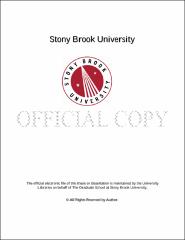| dc.identifier.uri | http://hdl.handle.net/11401/77538 | |
| dc.description.sponsorship | This work is sponsored by the Stony Brook University Graduate School in compliance with the requirements for completion of degree. | en_US |
| dc.format | Monograph | |
| dc.format.medium | Electronic Resource | en_US |
| dc.language.iso | en_US | |
| dc.publisher | The Graduate School, Stony Brook University: Stony Brook, NY. | |
| dc.type | Dissertation | |
| dcterms.abstract | Jewish-American literature is conventionally thought to be urban in terms of sensibility and geographical setting. This is understandable given that the city, especially New York, has figured centrally in the genre. Yet the strong identification of Jewish-American writing with urbanism, I show in this study, has obscured a significant strain of exurban desire in the works of Jewish-American poets and novelists. Even the emerging subfield of Jewish spatial studies continues to overlook representations of rural areas and nature in Jewish-American literature despite its expressed commitment to examine sites previously ignored by literary scholars. My project begins to remedy this neglect by recovering and interpreting the complex of exurbanism in the poetry of Morris Rosenfeld, Yehoash, and I.J. Schwartz, and in novels and stories by Bernard Malamud, Saul Bellow, and Philip Roth. Far from being sui generis, the exurbanism of these writers, I argue, is contiguous with the incipient naturism of Haskalah (Jewish Enlightenment) intellectuals, who sought to usher traditional European Jews into modernity, and inspired by motifs and ideals latent in Jewish liturgy, (neo-)Hasidism, the Hebrew Bible, and Yiddishkayt. Not surprisingly, Jewish-American literary exurbanism is also indebted to Euro-American pastoral, and specifically to such writers as Henry David Thoreau and Walt Whitman. A profoundly hybrid construction, Jewish-American literary exurbanism, I contend, inflects both Jewish and American identity, the former by valorizing a topos viewed as inherently assimilationist by Jewish traditionalists, and the latter through its critique of the masculinism, inwardness, and escapism that are associated with conventional forms of pastoral. | |
| dcterms.available | 2017-09-20T16:52:53Z | |
| dcterms.contributor | Manning, Peter | en_US |
| dcterms.contributor | Scheckel, Susan | en_US |
| dcterms.contributor | Hutner, Heidi | en_US |
| dcterms.contributor | Omer-Sherman, Ranen. | en_US |
| dcterms.creator | Oil, Michael | |
| dcterms.dateAccepted | 2017-09-20T16:52:53Z | |
| dcterms.dateSubmitted | 2017-09-20T16:52:53Z | |
| dcterms.description | Department of English. | en_US |
| dcterms.extent | 156 pg. | en_US |
| dcterms.format | Application/PDF | en_US |
| dcterms.format | Monograph | |
| dcterms.identifier | http://hdl.handle.net/11401/77538 | |
| dcterms.issued | 2015-05-01 | |
| dcterms.language | en_US | |
| dcterms.provenance | Made available in DSpace on 2017-09-20T16:52:53Z (GMT). No. of bitstreams: 1
Oil_grad.sunysb_0771E_12260.pdf: 1773244 bytes, checksum: 93cb87ac1ce22220ca60af4cc5317e19 (MD5)
Previous issue date: 2015 | en |
| dcterms.publisher | The Graduate School, Stony Brook University: Stony Brook, NY. | |
| dcterms.subject | Literature | |
| dcterms.subject | Ecocriticism, Exurbia, Jewish identity, Nature, Pastoral, Yiddishkayt | |
| dcterms.title | Representations of Exurbia in Jewish-American Literature | |
| dcterms.type | Dissertation | |

